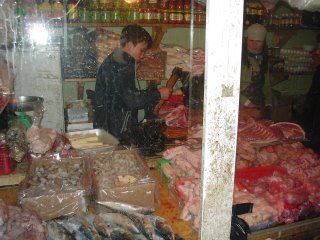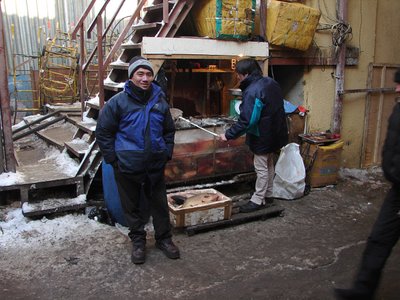Prosperity Theology
"Render to Caesar the things that are Caesar's, and to God the things that are God's"
~Mark 12:13-17
Manhattan, for all its long history, is really at best a study in change. Nothing has pointed that out to me more than being away for a year. Now, I walk around my neighborhood and notice the dramatic changes in that short time. Some are natural, some are strange, and some are downright discomfiting.
For the past couple of years, it seemed that Starbucks was going to take over the city. The chain's penchant for corner locations made the stores seem even more ubiquitous than they really were. I wasn't really prepared for the next step - mid-block expansion. Now it seems that one is never more than a few steps away from a standard-issue coffee shop. And it also seems that each one is doing pretty good business. Of course, at these prices the company may well be going for a high-margin, low-volume strategy. Still, Starbucks fills cultural, societal, business needs for large swathes of the Manhattan population. These stores have successfully become the living rooms, studies, and conference rooms of space-constrained New Yorkers.
But being plopped back in NYC after a year away has allowed me a new perspective. Starbucks isn't expanding in non-corner locations because of some sort of new location strategy. It's simpler than that - even the ludicrously profitable coffee business can't compete with the intense demand for this kind of corner real estate.
It seems that every corner in Manhattan south of 96th street has been converted into a bank branch. And these aren't small outposts in good locations. The banks are forcing supermarkets and other large-scale retailers out of these locations - and taking the whole space. No joke and no exaggeration. These branches are massive on any scale of analysis. And they're absolutely everywhere now.
That reflects, I suppose, the city's constant renewal and change. After all, it's Manhattan; there's probably no better symbol of the city than the rapid expansion of what are in effect money stores.
Except maybe one.
On W. 4th street near Washington Square Park, there's a grand old church. It's been there since 1860, and for many years has run a soup kitchen out of its basement on Sunday afternoons. That is, until recently. The building was sold, and is now being converted to housing. Not low income, in case you were wondering. No, this is Manhattan 2006. It's being converted into a handful of condo lofts selling for $6 million apiece.
The mind begins to boggle at just a glimmer of the symbolism and contrast.
And then it gets better. The sales slogan for the property is "Come Be Reborn." It's audacious, probably blasphemous, and insulting. As if salvation can be bundled along with a jumbo mortgage.
I suppose its fitting in some ways. Money and real estate are both religions in New York. Historically, it fits alright with Puritanism and Calvinism - strong currents in the early US. And now? Well, this is an era when the idea of prosperity theology - the belief that financial success is external evidence of God's favor - is gaining more and more traction.
In my belief system though, I have to believe that there's a special place in Hell for people who market luxury condominiums in a former church in this manner.
And a place for me, too, because I'd really, really like to have one for myself.






